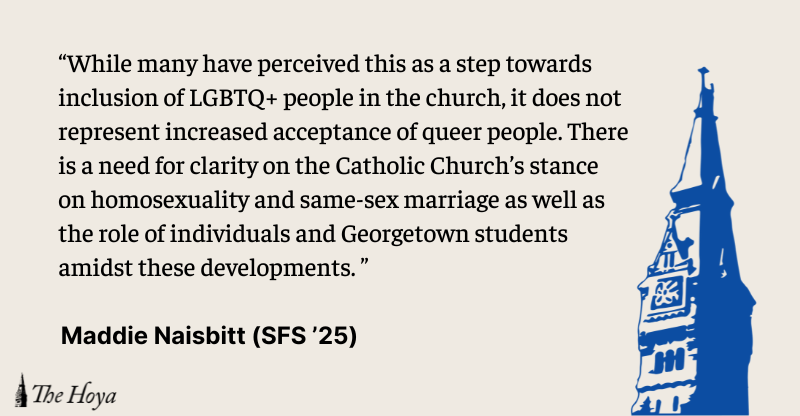On Nov. 6, 2023, Fr. James Martin, S.J., a priest known for his advocacy and a member of Georgetown University’s Board of Directors, spoke at Georgetown, detailing the spiritual lessons from the story of Lazarus. The event was met with protest from members of Tradition, Family and Property (TFP), a conservative Catholic organization.
They were not protesting the contents of Martin’s speech, but rather his record of LGBTQ+ advocacy within the church. Georgetown students staged a counter-protest, denouncing TFP’s hateful rhetoric. The Georgetown administration also condemned TFP’s protest, stating it did not represent Georgetown’s Jesuit values or the views of the Catholic Church.
Not even two months later, on Dec. 18, 2023, Pope Francis announced that priests were now allowed to bless same-sex and unmarried couples. Although this announcement was controversial, it did not actually change the Catholic Church’s teachings regarding homosexuality and same-sex marriage.
While many have perceived this as a step towards inclusion of LGBTQ+ people in the church, it does not represent increased acceptance of queer people. There is a need for clarity on the Catholic Church’s stance on homosexuality and same-sex marriage as well as the role of individuals and Georgetown students amidst these developments.
As students at a Catholic university, we cannot effectively advocate policy changes or protect LGBTQ+ rights on campus without fully understanding the church’s position on homosexuality. As Catholic teachings are often complex and built on hundreds of years of tradition and scholarship, we must first examine the church’s teachings before delving into the limited impact of blessing same-sex couples.
Homosexuality is not in itself a sin within Catholicism, but the church catechism describes it as an inclination that is “objectively disordered.” Homosexual acts are a sin within Catholicism and the church recommends that gay Catholics remain celibate. The Catholic Church does not see gay marriage as a legitimate form of marriage, as it defines marriage as a covenant between a man and a woman — a metaphor for Jesus Christ’s relationship to his “bride,” the church. Whether or not queer Catholics choose a path of celibacy, the church’s teachings against homosexuality can cause a life of struggle as they wrestle between their religion and their innate sexual orientation.
When it comes to blessings, until this past December, same-sex couples were not allowed to receive priestly blessings because their actions are not considered in line with church teachings. The Pope altered these guidelines with the Fiducia Supplicans Declaration, allowing same-sex couples to be blessed with the reasoning that asking for a blessing signals one’s desire to become more in line with “God’s will”. This step did not change the church’s teaching on homosexuality but rather its regulations on blessings.
When performing the blessing, the Catholic Church outlines that the blessing and a marriage ceremony must be distinct to avoid “confusion with the blessing proper to the Sacrament of Marriage.” The declaration does not mandate priests to bless same-sex couples; it simply gives them the option to. Some priests and bishops have rejected this change.
Take the Symposium of Episcopal Conferences of Africa and Madagascar (SECAM) as an example. This group refuses to bless same-sex couples, citing their belief that same-sex unions do not conform to the church’s teachings on homosexuality.
The Fiducia Supplicans Declaration does not actually say that same-sex relationships are in line with God’s will or church teachings — it just removes the requirement for something to be in line with church teachings to be blessed. What this means is that if the blessing is effective and the couple “grows in fidelity to the Gospel,” and are “freed from their imperfections and frailties,” they will end their relationship and stop committing the sin of homosexuality.
Church teachings on homosexuality remain the same and these blessings act as a spiritual encouragement for gay Catholics to turn away from their actively homosexual lifestyle and become more in line with God’s will. This means that rather than moving towards accepting LGBTQ+ people, the church maintains its harmful expectation of celibacy for queer Catholics.
The church’s official teachings are not representative of all Catholic thought on homosexuality, however. There are progressive forces within the church attempting to more meaningfully shift the church’s position, and Fr. Martin is one of the most prominent of these activists. He has criticized the harsh language in the catechism, acknowledging the harm of pushing gay Catholics away rather than bringing them closer to the church.
Martin welcomed the decision to allow blessings for same-sex couples and has already blessed several couples. He argues that while the decision may not go as far as some LGBTQ+ Catholics would like, it is a key step forward in including LGBTQ+ people and same-sex couples in the church community.
Many Catholics align with this more progressive view of homosexuality and gay marriage. While conservative Catholic lay groups like TFP generate attention for their anti-LGBTQ+ positions, they make up the minority view among American Catholics. As of 2020, 69% of American Catholics support gay marriage. That includes 56% of Catholics who say that religion is “very important” to them. Much like the Georgetown students who protested against TFP’s message, the average Catholic in the United States does not fully align with the church’s official teachings on homosexuality.
Through opposing TFP, the Georgetown community came together to oppose unproductive, hateful rhetoric against LGBTQ+ people. To most effectively advocate for queer rights at Georgetown, where Catholic teachings influence our university policies, we must understand Catholic teachings on homosexuality.
At the same time, we can embrace allies within the Catholic Church who are pushing the church to more fully embrace LGBTQ+ people. Blessing same-sex marriages is a small step in the right direction, but it is insufficient to relieve the suffering millions of queer Catholics experience under the church’s current teachings.
Maddie Naisbitt is a junior in the School of Foreign Service.














